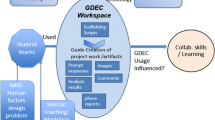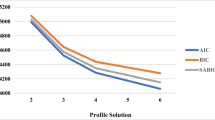Abstract
This paper contributes to our understanding of how to design learning analytics to capture and analyse collaborative problem-solving (CPS) in practice-based learning activities. Most research in learning analytics focuses on student interaction in digital learning environments, yet still most learning and teaching in schools occurs in physical environments. Investigation of student interaction in physical environments can be used to generate observable differences among students, which can then be used in the design and implementation of Learning Analytics. Here, we present several original methods for identifying such differences in groups CPS behaviours. Our data set is based on human observation, hand position (fiducial marker) and heads direction (face recognition) data from eighteen students working in six groups of three. The results show that the high competent CPS groups spend an equal distribution of time on their problem-solving and collaboration stages. Whereas, the low competent CPS groups spend most of their time in identifying knowledge and skill deficiencies only. Moreover, as machine observable data shows, high competent CPS groups present symmetrical contributions to the physical tasks and present high synchrony and individual accountability values. The findings have significant implications on the design and implementation of future learning analytics systems.
Access this chapter
Tax calculation will be finalised at checkout
Purchases are for personal use only
Similar content being viewed by others
References
Banks, F., Barlex, D.: Teaching STEM in the secondary school: Helping teachers meet the challenge. Routledge, London (2014)
Kirschner, P.A., Sweller, J., Clark, R.E.: Why minimal guidance during instruction does not work: an analysis of the failure of constructivist, discovery, problem-based, experiential, and inquiry-based teaching. Educ. Psychol. 41(2), 75–86 (2006)
Klahr, D., Nigam, M.: The equivalence of learning paths in early science instruction effects of direct instruction and discovery learning. Psychol. Sci. 15(10), 661–667 (2004)
Blikstein, P., Worsley, M.: Multimodal learning analytics and education data mining: using computational technologies to measure complex learning tasks. J. Learn. Anal. 3(2), 220–238 (2016)
Rodríguez, F.J., Boyer, K.E.: Discovering individual and collaborative problem-solving modes with hidden Markov models. In: Conati, C., Heffernan, N., Mitrovic, A., Verdejo, M.F. (eds.) AIED 2015. LNCS, vol. 9112, pp. 408–418. Springer, Cham (2015). doi:10.1007/978-3-319-19773-9_41
Martinez-Maldonado, R., Kay, J., Yacef, K.: An automatic approach for mining patterns of collaboration around an interactive tabletop. In: Lane, H.C., Yacef, K., Mostow, J., Pavlik, P. (eds.) AIED 2013. LNCS, vol. 7926, pp. 101–110. Springer, Heidelberg (2013). doi:10.1007/978-3-642-39112-5_11
OECD: Draft Collaborative Problem Solving Framework (2015). http://www.oecd.org/pisa/pisaproducts/Draft. PISA 2015 Collaborative Problem Solving Framework.pdf
Luckin, R., Baines, E., Cukurova, M., Holmes, W.: Solved! Making the case for collaborative problem-solving. London, NESTA (2017)
Dillenbourg, P., Jermann, P.: Designing integrative scripts. In: Fischer, F., Kollar, I., Mandl, H., Haake, J.M. (eds.) Scripting Computer-Supported Collaborative Learning: Cognitive, Computational and Educational Perspectives, pp. 275–301. Springer, Boston (2007)
Hmelo-Silver, C.E.: Problem-based learning: what and how do students learn. Educ. Psychol. Rev. 16(3), 235–266 (2004)
Cukurova, M., Avramides, K., Spikol, D., Luckin, R., Mavrikis, M.: An analysis framework for collaborative problem solving in practice-based learning activities: a mixed-method approach. In: LAK 2016, pp. 84–88. ACM (2016)
Ruffaldi, E., Dabisias, G., Landolfi, L., Spikol, D.: Data collection and processing for a multimodal learning analytic system. In: SAI 2016, pp. 858–863 (2003)
Kreijns, K., Kirschner, P.A., Jochems, W.: Identifying the pitfalls for social interaction in computer-supported collaborative learning environments: a review of the research. Comput. Hum. Behav. 19(3), 335–353 (2003)
Lakens, D., Stel, M.: If they move in sync, they must feel in sync. Soc. Cogn. 29(1), 1–14 (2011)
Schneider, B., Pea, R.: Real-time mutual gaze perception en- hances collaborative learning and collaboration quality. Int. J. Comput. Support. Collab. Learn. 8(4), 375–397 (2013)
Schneider, B., Blikstein, P.: Unraveling students’ interaction around a tangible interface using multimodal learning analytics. J. Educ. Data Min. 7(3), 89–116 (2015)
Slavin, R.E.: Synthesis of research of cooperative learning. Educ. Leadersh. 48(5), 71–82 (1991)
Damon, W., Phelps, E.: Critical distinctions among three approaches to peer education. Int. J. Educ. Res. 13(1), 9–19 (1989)
Spikol, D., Ruffaldi, E., Cukurova, M.: Using Multimodal Learning Analytics to Identify Aspects of Collaboration in Project-Based Learning. In: CSCL 2017, Philadelphia, PA (2017)
Acknowledgements
This work is co-funded by the European Union under the PELARS project. The fourth author was partially supported by Agencia Estatal de Investigacion (AEI) y el Fondo Europeo de Desarrollo Regional (FEDER), TIN2016-80774-R.
Author information
Authors and Affiliations
Corresponding author
Editor information
Editors and Affiliations
Rights and permissions
Copyright information
© 2017 Springer International Publishing AG
About this paper
Cite this paper
Cukurova, M., Luckin, R., Mavrikis, M., Millán, E. (2017). Machine and Human Observable Differences in Groups’ Collaborative Problem-Solving Behaviours. In: Lavoué, É., Drachsler, H., Verbert, K., Broisin, J., Pérez-Sanagustín, M. (eds) Data Driven Approaches in Digital Education. EC-TEL 2017. Lecture Notes in Computer Science(), vol 10474. Springer, Cham. https://doi.org/10.1007/978-3-319-66610-5_2
Download citation
DOI: https://doi.org/10.1007/978-3-319-66610-5_2
Published:
Publisher Name: Springer, Cham
Print ISBN: 978-3-319-66609-9
Online ISBN: 978-3-319-66610-5
eBook Packages: Computer ScienceComputer Science (R0)




